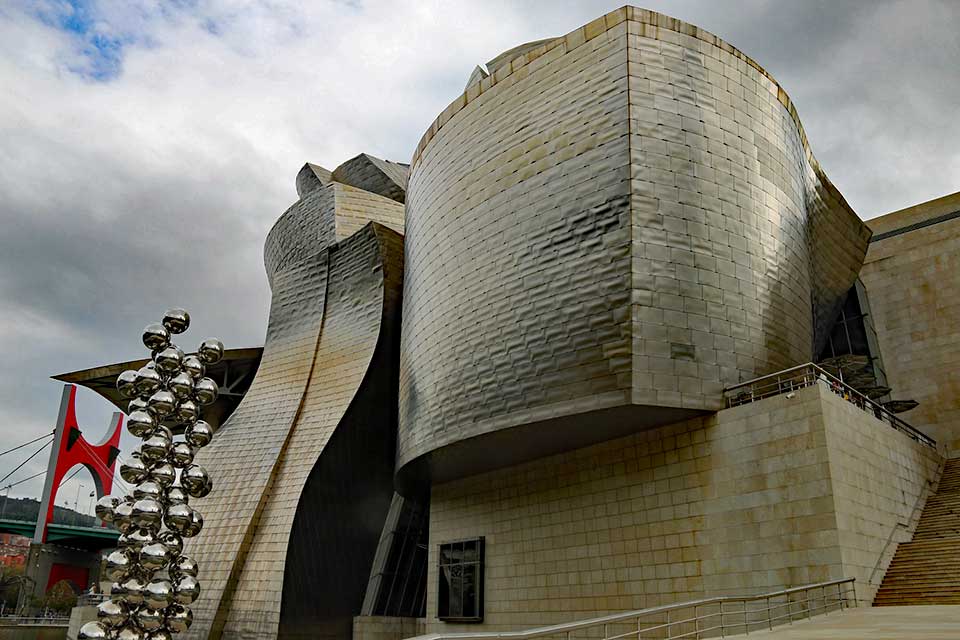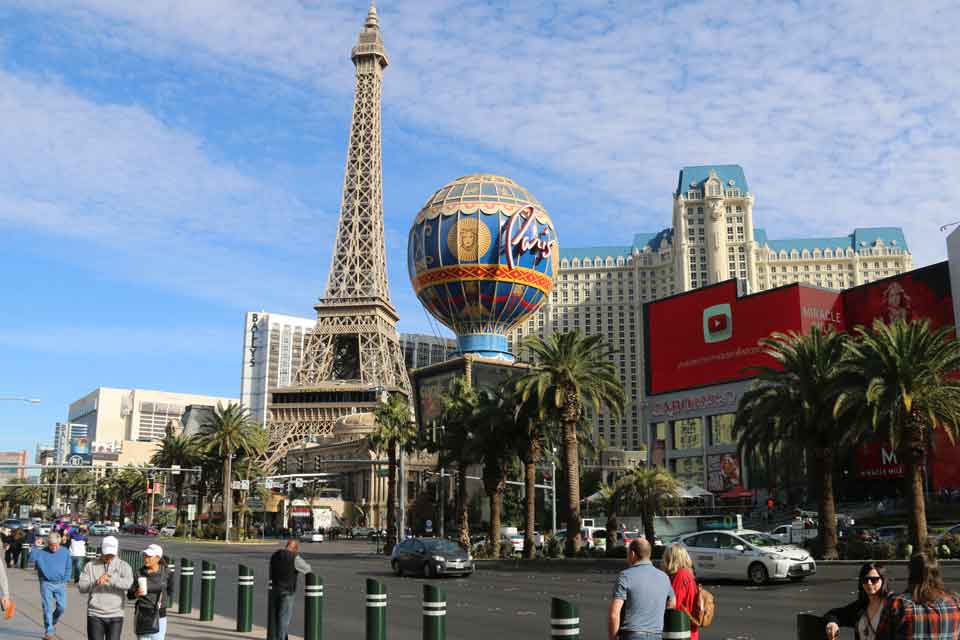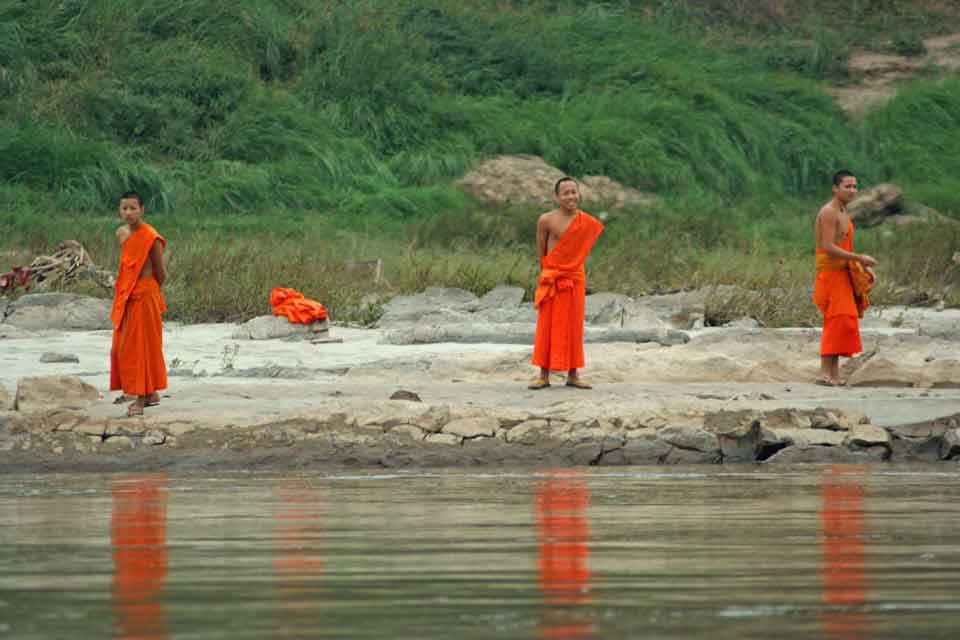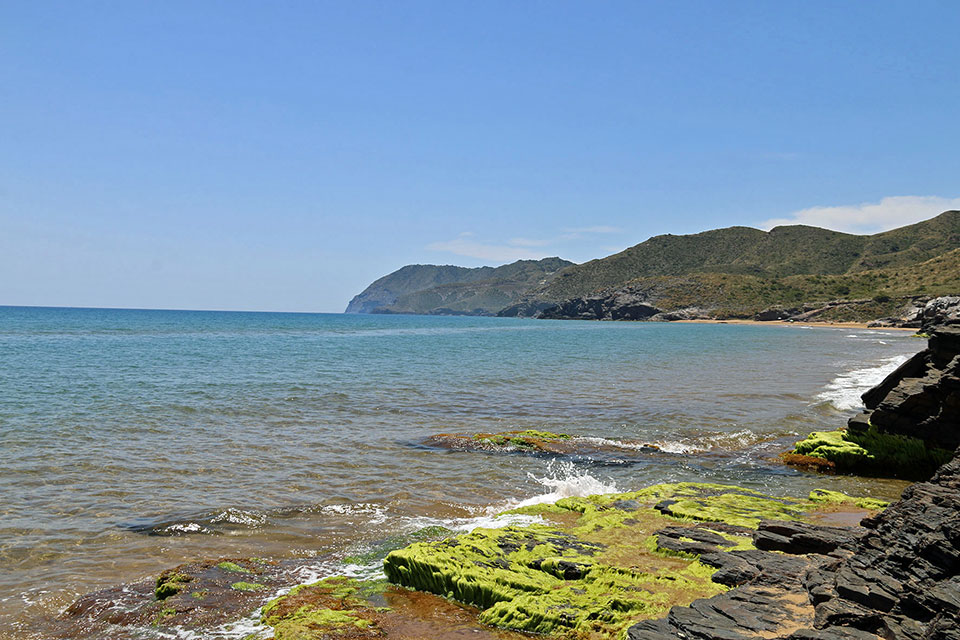A short flight from Laos and we descend into Cambodia - a Kingdom with a mixed legacy of enlightenment and mass genocide.
The country’s heart and soul is undisputedly the Angkor Wat - the most ancient of the world’s seven wonders.
Awe Inspiring
Nothing could prepare us for the world’s largest religious monument spanning 162 hectares.
We were picked up by our guide at 6:00am - the rationale behind which soon became clear as the temperature climbed into the 80’s by 8 o’clock.
Built in the first half of the 12th century for King Suryavarman II who dedicated it to the Hindu God Vishnu, it took around 30 years to complete.
As with the Egyptian pharaohs, the Cambodian god-kings felt compelled to leave a monument bigger and better than their predecessors. The temple is also said to be a mausoleum for the King.
Not since the mind-blowing experience of the first of the Terracota Warriors in Xian, China, had we seen such a wondrous and vast sight.
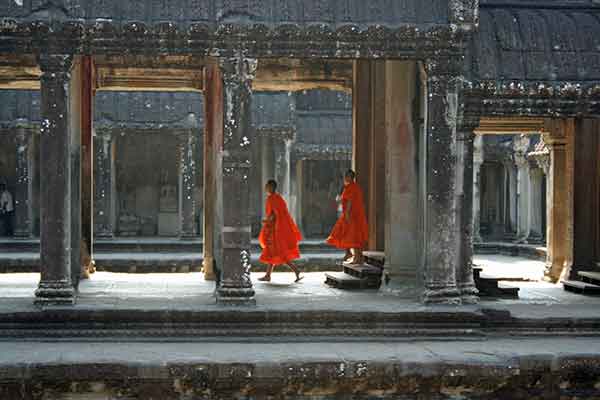 Angkor Wat is a pilgrimage for Buddhist monks worldwide.
Angkor Wat is a pilgrimage for Buddhist monks worldwide.
National Symbol
A proud national symbol, the temple - the centrepiece of Khmer civilisation - has remained open and enjoyed almost continually for nine centuries.
The overall shape resembles a lotus bud and we took in the soaring height of its five dominant towers believed to symbolise Mount Meru’s peaks - the gods’ dwelling place according to Hindu mythology. The ingenious structure of the UNESCO World Heritage Site is designed so visitors can only see all five towers from certain angles.
Magical Backdrop
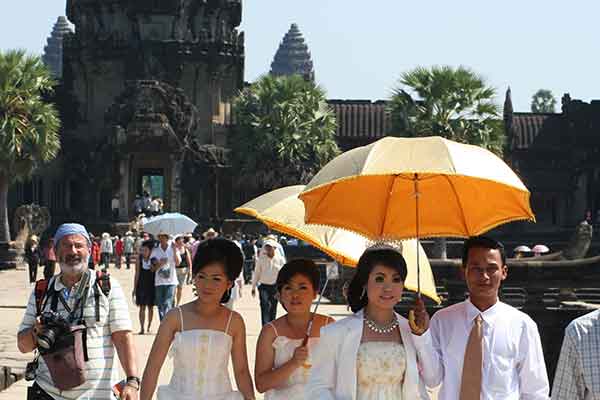 Momentous occasion: the temple is popular for weddings.
Momentous occasion: the temple is popular for weddings.
To our delight, when we arrived at the main 820 ft sandstone causeway, we encountered a stunning bride and groom - what a magnificent location for tying the knot!
We spent the next few hours absorbing the exquisitely detailed carvings, statues and monuments. They included the mesmerising Apsaras (heavenly nymphs). Almost 2,000 are carved into the walls - each one is unique, and there are apparently 37 different hairstyles.
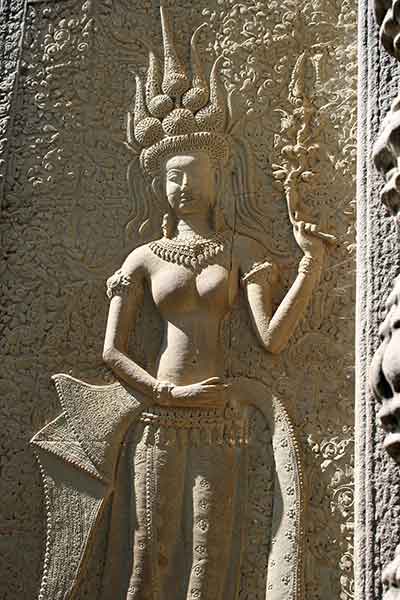 Celestial beings: Apsara carved in stone.
Celestial beings: Apsara carved in stone.
One gallery depicts a triumphal procession following a battle between the Khmers and their enemies involving mainly hand-to-hand combat.
Angkor Wat’s prominence further rocketed in 2001 when Angelina Jolie starred as Lara Croft in Tomb Raider - part of which was filmed at Ta Prohm temple. Immersed by amazing huge silk-cotton trees and strangler figs, the intriguing shrine evokes romance.
 Movie Star: The romantic Ta Prohm temple.
Movie Star: The romantic Ta Prohm temple.
Originally known as ‘Monastery of the King’, the 12th century Ta Prohm Buddhist holy shrine was one of the few temples in the Angkor region where an inscription provides information about its dependents and inhabitants.
Angkor Sunset
Not to be missed is the sensational sunset from Phnom Bakheng mountain temple - another architectural treasure. The highest temple in the Angkor Archaeological Park, we flocked with hundreds of visitors for panoramic landscape.
 Panoramic views from Phnom Bakheng.
Panoramic views from Phnom Bakheng.
From 2001 tourists ascended and descended on elephant rides which were banned in 2019 following a campaign by animal rights groups. The World Wildlife Fund is concerned at the large decrease in the number of elephants which are officially listed as an endangered species.
Energy permitting, other attractions in Siem Riep include the night market set up in 2007 to help preserve traditional Khmer handicrafts. With over 200 bamboo huts selling clothing and handicrafts by local communities, it was here we bought our ticket for the next adventure - a trip down the Mekong to Phnom Pehn (beware at certain times of the year April, May, and June, the river can be dried up).
Bumpy Ride
Up with the larks to catch the 7:30am boat, we were picked up by a small vehicle - what followed was a whole new experience.
Bumping us up and down the makeshift potholed roads, the driver packed in more and more passengers, their backpacks and luggage - not to mention locals with their possessions.
Just when we joked that he could not possible squeeze in anyone or anything more - in an amazing and dangerous logistical feat he picked up a teenage boy and his bicycle.
Mekong Adventure
 The Meekong teems with activity.
The Meekong teems with activity.
We made the boat by the skin of our teeth as it prepared to leave the packed jetty - taking a punt on which was the right one due to an absence of information about where the boats were bound.
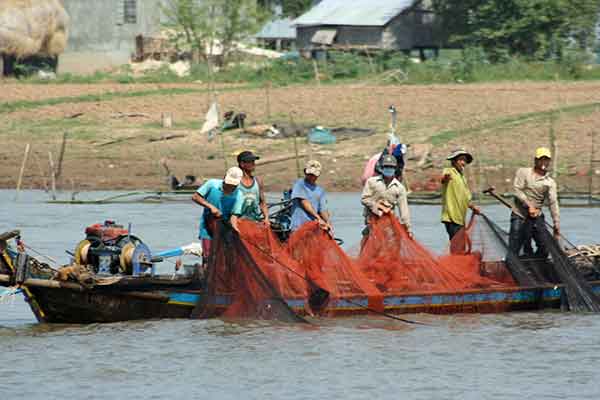 Casting nets: fishermen on the Mekong.
Casting nets: fishermen on the Mekong.
What an adventure speeding down the Meekong - the driver making no allowances for fishermen or other boats which were adept at quickly scarpering out of the way.
 Speeding to Phnom Penh: inside the boat.
Speeding to Phnom Penh: inside the boat.
The boat was narrow and claustrophobic inside (at least we had our own seat).Outside was a narrow roof where backpackers hung onto a ledge and sat or lay down - emerging the other end sore and sunburnt after six hours in the relentless blazing heat.
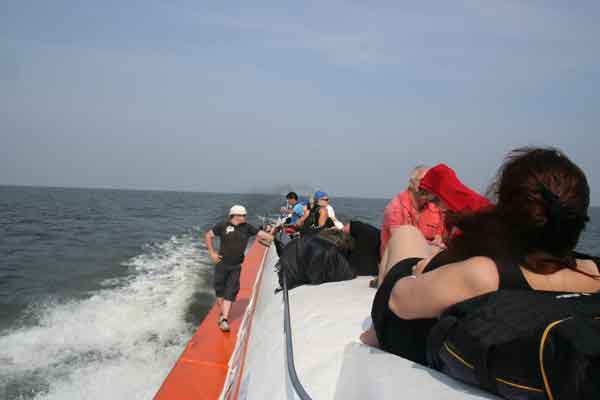 No shelter: passengers outside the boat.
No shelter: passengers outside the boat.
A chaotic arrival at Phnom Penh saw us pile off the boat to be besieged by a multitude of taxi drivers vying for our trade and offering places to visit and stay. Our backpacks deposited at a small hotel, we were ready to learn more about Cambodia’s horrific history.
Haunted Past
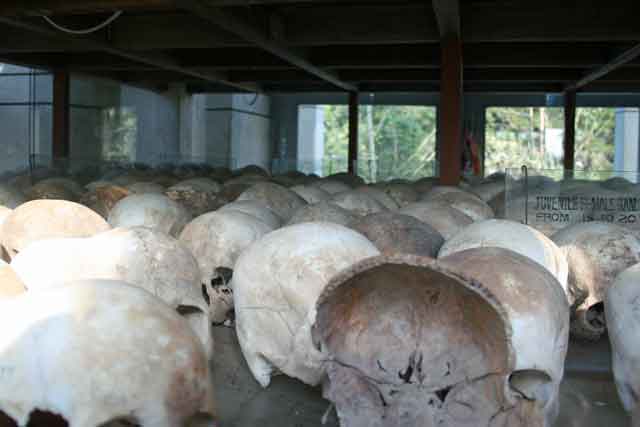 Mass genocide: Killing Fields horror.
Mass genocide: Killing Fields horror.
It soon became apparent that the brutal atrocities committed by the Khmer Rouge had left the country bereft of a generation, with young people running bars and businesses - their grandparents butchered at the hands of a vicious regime.
A very sad and sobering visit to the Killing Fields brought home the horror of Pol Pot’s reign (1975-1979) when an estimated 1.7 million Cambodians - 25 per cent of the entire population - died through execution, starvation or disease.
 Killing fields horror.
Killing fields horror.
Various killing fields exist in Cambodia, with over 20,000 mass grave sites. Our visit to the largest of the killing fields at Choeung Ek on the outskirts of Phnom Penh serves as a monument to the dead and the survivors.
 Memorial stupa serves as reminder of atrocities.
Memorial stupa serves as reminder of atrocities.
It was a harrowing but important experience - the remains of almost 10,000 people were exhumed from the mass graves that litter the former orchard.
In a memorial stupa created in 1988 which forms the site’s centrepiece has glass sides we witnessed many layers of human skulls - almost half of the total number of people executed at the site. Some skulls reveal marks of the trauma they were subjected to before execution.
 Visible remains: the stupa memorial has glass sides.
Visible remains: the stupa memorial has glass sides.
The moving memorial serves as a stark reminder about the bitter past and to ensure the lives lost are never forgotten.
Our knowledgeable guide, who had studied the horrific history at University to enable her to give visitors an in-depth account, also showed us pits which were used as mass graves. We witnessed the harrowing sign of fragments of bones which can still be seen.
 Two million Cambodians slaughtered under Pol Pot regime.
Two million Cambodians slaughtered under Pol Pot regime.
We reflected on the abject horror and wasted lives at the Foreign Correspondents’ Club - originally a meeting place for foreign correspondents and war reporters which affords stunning views of the Mekong.
Wealth of Sightseeing
The pulsating energy and noise of Phnom Penh where dogs (plural) ride bareback on motorbike and cycles contrasts starkly with the eerie silence of the Killing Fields.
Depending on your timetable, Phnom Penh offers wide-ranging cultural and leisure attractions including markets and Mekong river trips.
 Insight into Cambodian life on the Meekong.
Insight into Cambodian life on the Meekong.
Sightseeing includes The National Museum of Cambodia housing the country’s largest museum of cultural history. Cambodia’s leading historical and archaeological museum, striking statues include Cambodian warriors and a Vishnu statue from the 6th century with eight arms.
 Terracota treasure: National Museum of Cambodia.
Terracota treasure: National Museum of Cambodia.
Allow at least half a day to take in the multitude of artefacts including models of traditional Khmer houses, clothing and accessories spanning ancient times to the modern day. A shaded garden enables visitors to cool down and photographs are restricted to the central courtyard.
In Search of Paradise
 Paradise found: waves lapping on Bamboo Island.
Paradise found: waves lapping on Bamboo Island.
Our next stop was the seaside resort of Sihanoukville located on the eastern part of the Gulf of Thailand - a peninsula with several beaches and small, offshore islands.
Finding it noisy, tacky and unappealing, we escaped on 30 minute ride in a fishing trawler to Bamboo Island. Our home for the next three days on the paradise was a basic bamboo hut where we woke to the waves crashing against the shore. One shack served food where the catch of the day was fantastically fresh.
The sense of deep relaxation and wellbeing made it hard to leave the island - so much so that some backpackers we met had gone for eight days and stayed eight months. However as Vietnam and our next adventure beckoned, we reluctantly returned to the mayhem of the mainland.










